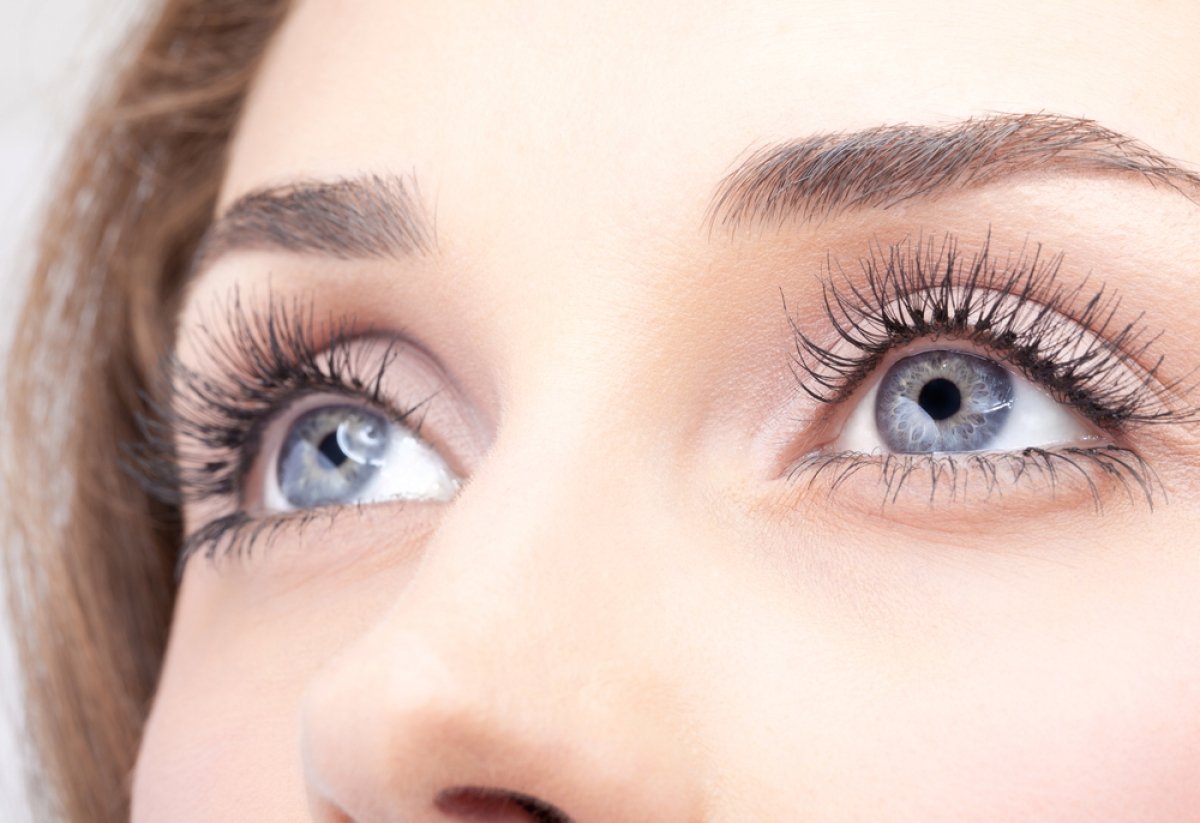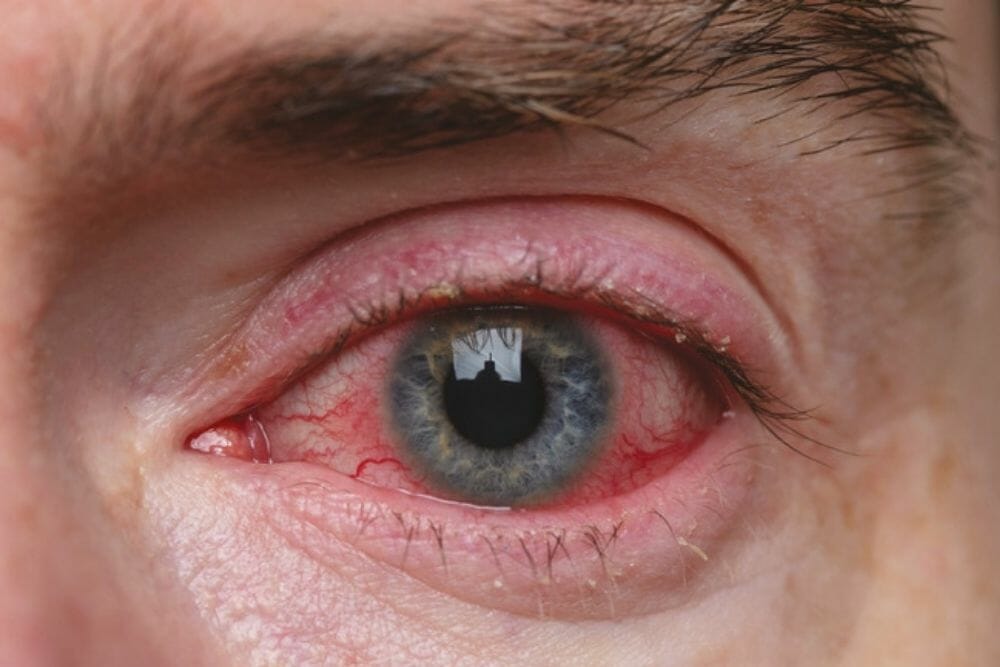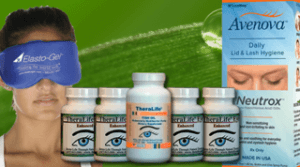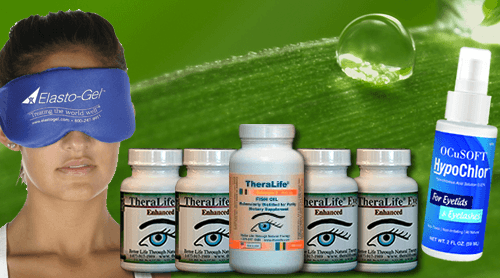Introduction- Ocular Rosacea Relief
Ocular rosacea is a chronic inflammatory condition of the eyes that results in redness, burning and itching. Symptoms can be mild or severe and may persist over time if left untreated.
This article provides an overview of natural remedies for ocular rosacea relief with information on how these treatments work to reduce symptoms and promote healthier eyes.
Natural remedies have become increasingly popular due to their ability to provide effective treatment without harsh side effects often associated with pharmaceutical medications.
Research has shown that some natural therapies may offer significant improvements in symptom reduction and improved quality of life for those suffering from ocular rosacea.
This article provides an analysis of the top natural remedies for ocular rosacea relief including diet modifications, herbal supplements and lifestyle changes.
Best Ocular Rosacea Relief – All Natural TheraLife
Understanding Ocular Rosacea- Ocular Rosacea Relief
Ocular rosacea is a common but treatable condition that affects the eyes, causing redness and irritation. It can be caused by genetics or environmental factors such as sun exposure, wind, cold temperatures, humidity, and changes in temperature. In some cases, it may also result from certain medications or nutritional deficiencies.
The best way to manage ocular rosacea is through lifestyle modifications including skin care and dietary modifications. Alternative treatments have been found to help reduce symptoms associated with ocular rosacea.
Proper skin care is one of the most effective methods for controlling symptoms. This includes avoiding harsh cleansers and makeup products that contain alcohol or other irritating ingredients which could make symptoms worse. Additionally, it’s important to use gentle moisturizers on a regular basis to keep the skin hydrated and protected against irritants.
It is also recommended that people with ocular rosacea take steps to protect their eyes from further damage due to environmental triggers like UV rays from the sun or windy weather conditions. Wearing sunglasses when outdoors can provide extra protection for sensitive eyes.
With these measures in place, individuals can work towards achieving relief from their symptoms of ocular rosacea and maintain healthier eyes over time. Transitioning now into modifying diet habits for managing this condition….
Dietary Modifications- Ocular Rosacea Relief
Ocular rosacea is a chronic eye condition that may be difficult to manage. It involves inflammation of the eyes, which can cause redness, swelling and irritation. While there is no cure for ocular rosacea, some natural remedies may provide relief from the symptoms.
Dietary modifications are one way to help reduce the severity of this condition. In order to effectively treat ocular rosacea through dietary changes, it is important to determine if any allergies exist that may trigger an immune response in the body related to the condition. Allergy testing can help identify these allergens so they can be avoided or managed accordingly.
Additionally, increasing intake of probiotics has been shown to improve overall health and well-being as well as reduce inflammation associated with various conditions like ocular rosacea. Probiotic supplementation should be discussed with a healthcare provider prior to use since quality products vary widely depending on brand and source of ingredients.
Finally, specific foods such as dark leafy greens, lean proteins and omega-3 fatty acids have all been linked with improved eye health when consumed regularly over time. Eating fresh fruits and vegetables high in antioxidants can also offer additional benefits by helping protect against potential damage caused by environmental factors like air pollution or sun exposure. With careful attention paid to diet choices, many people find that their ocular rosacea symptoms become more manageable over time.
The next step in managing ocular rosacea naturally is exploring herbal supplements that may further aid in reducing its effects on vision and comfort levels around the eyes.
Herbal Supplements- Ocular Rosacea Relief
Herbal supplements are a popular option for those wishing to find relief from ocular rosacea. Herbal teas have been used historically as part of traditional Chinese and Ayurvedic medicines, with many ingredients believed to be beneficial in relieving the symptoms of ocular rosacea.
Turmeric is one such herb that has anti-inflammatory properties, which may help reduce inflammation caused by ocular rosacea. Other herbal supplements include borage oil, milk thistle and eyebright, although further research is needed to confirm their efficacy.
When considering taking any form of supplement it is important to consult with a healthcare professional before beginning treatment. This will ensure that there are no interactions between medications taken concurrently or other health conditions which could cause adverse effects with certain herbs or supplements.
It is also important to note that some herbal remedies can take time before they show results and should not be expected to provide immediate relief.
Eye exercises can be another potential method of providing relief from ocular rosacea symptoms. Exercises such as palming technique, where hands are placed over closed eyes for several minutes at a time, are thought to help relax strained eyes whilst reducing redness and swelling associated with the condition.
Additionally, focusing on objects both near and far away helps improve eye muscle strength and focus control. Transitions lenses have also been found to offer protection against UV light while still allowing sufficient amounts of visible light into the eyes when worn outdoors during daylight hours.
Eye Exercises- Ocular Rosacea Relief
Eye exercises can be an effective way to provide relief from ocular rosacea.
One of the more popular and beneficial forms of eye exercise is cleansing breathwork, which helps to reduce stress levels that might otherwise cause flare-ups in ocular rosacea symptoms. This type of breathing technique involves inhaling deeply for four seconds and exhaling slowly for eight seconds. It should be done several times a day or as needed during periods when increased stress may lead to worsening symptoms.
In addition to cleansing breathwork, another form of eye exercise that can help with ocular rosacea is an eye massage. Eye massages involve gently rubbing the eyes in small circles while paying attention to any areas where soreness or discomfort are present. Doing this once or twice daily on affected areas can help reduce inflammation and irritation associated with ocular rosacea. Furthermore, it also encourages healthy blood flow throughout the facial area, allowing more oxygenated blood to reach the eyes and further aiding in symptom relief.
These two types of eye exercises have been found to be beneficial in providing immediate relief from mild cases of ocular rosacea as well relieving chronic conditions over time. With regular use, they may even prevent future episodes from occurring by decreasing overall stress levels connected with flare-ups.
By transitioning into habits such as these, individuals may find themselves better equipped at managing their condition effectively moving forward. To further support this effort, incorporating strategies for reducing long-term stress through practices like mindfulness meditation and yoga could prove highly beneficial in achieving optimal outcomes for those dealing with chronic issues related to ocular rosacea.
Stress Management- Ocular Rosacea Relief
When it comes to ocular rosacea relief, eye exercises may help with mild cases. However, they do not address the root causes of this painful condition and can only provide temporary symptomatic relief in some instances. Therefore, many people are now turning towards stress management techniques for a more holistic approach.
Stress has been identified as one possible cause of ocular rosacea flare-ups due to its ability to interfere with blood flow and weaken the body’s natural defenses against inflammation. Managing stress through lifestyle changes such as mindfulness meditation and relaxation activities can aid in reducing symptoms associated with ocular rosacea while helping prevent future flares.
Here are 3 effective ways to reduce stress:
* Practicing regular deep breathing exercises
* Regularly engaging in physical exercise
* Eating healthy meals regularly
While these methods alone won’t cure ocular rosacea they can significantly improve quality of life by managing emotional triggers that could worsen the condition’s symptoms. To further boost healing times and alleviate discomfort caused by ocular rosacea, individuals should consider adding cold compresses into their daily routine.
Cold Compresses- Ocular Rosacea Relief
One of the most popular natural remedies for ocular rosacea relief is cold compresses. The use of damp cloths or tea bags, applied to the eyes and surrounding area, can provide a soothing sensation that may help reduce inflammation caused by irritation. Studies have shown that applying cool compresses to affected areas helps with reducing discomfort associated with dryness and itchiness. Additionally, using this remedy can lead to improved eye comfort due to its anti-inflammatory properties.
The method of application is straightforward: moisten a clean towel or compress in cool water and hold it against the closed eyelids for several minutes at a time before repeating as needed throughout the day.
Some people also recommend adding chamomile or green tea herbs into the warm water prior to soaking the cloths; it has been suggested that these herbs contain antioxidants which could further improve symptoms associated with ocular rosacea. While more research needs to be done on their efficacy, many sufferers find them helpful nonetheless.
It is important to note that cold compresses should not be overused because doing so may inadvertently cause further irritation. When used properly however, they can be an effective treatment option for those seeking ocular rosacea relief, particularly when combined with other topical treatments such as moisturizers and artificial tears.
Eye drops- Ocular Rosacea Relief
Natural oils have been found to be effective in reducing symptoms associated with ocular rosacea when using an eyewash solution. For example, lavender oil has been shown to reduce inflammation and redness of the eyelids associated with this condition when applied in small amounts directly on the skin around the eyes. In addition, almond oil may help soothe irritated eyes by providing relief against itching and burning sensations.
Eye drops are another form of treatment for ocular rosacea and they come in various forms including artificial tears, anti-inflammatory agents and antibiotics. Artificial tears work by replenishing moisture levels within the tear film which helps relieve dryness and irritation caused by ocular rosacea. Anti-inflammatory eye drops offer short-term symptomatic relief but should not be used over long periods of time due to potential side effects. Finally, antibiotic eye drops may provide some benefit in cases where bacterial infection is present however it is important to remember that these medications will need to be prescribed by an optometrist or doctor before use.
This section has highlighted two natural remedies – eyewashes containing natural oils and prescription eye drops – that could potentially bring about relief for individuals suffering from ocular rosacea. Moving forward, homeopathic remedies might also prove beneficial for treating this condition if traditional treatments fail to produce satisfactory results.
Homeopathic Remedies- Ocular Rosacea Relief
Following the use of eyewash as a natural remedy for ocular rosacea relief, homeopathic remedies are another option to consider. While these remedies have not been scientifically proven to be effective, they do offer an alternative approach that may help with symptom relief.
Homeopathic remedies often promote immune boosting and hydration therapy activities in order to restore balance within the body’s system. In other words, it helps to keep the skin around the eyes healthier by reducing inflammation caused by ocular rosacea.
Some potential homeopathic treatments include:
1. Drinking plenty of water throughout the day
2. Taking supplements such as omega-3 fatty acids or zinc
3. Eating foods rich in antioxidants like fruits and vegetables
4. Applying cold compresses on affected areas several times a day
It is important to note that while some people find success using homeopathic treatments for ocular rosacea relief, results vary from person to person and should always be discussed with a doctor before attempting any new treatment regimen. Additionally, regular checkups at an optometrist can help monitor symptoms and prevent further damage associated with this condition.
Frequently Asked Questions- Ocular Rosacea Relief
What Are The Long-Term Effects Of Ocular Rosacea?
The long-term effects of ocular rosacea are not well understood.
Studies suggest that the condition can lead to vision loss and chronic inflammation, as well as corneal complications such as dry eye syndrome or keratitis.
Additional studies indicate that diet modifications and alternative therapies may be helpful in reducing symptoms over time.
However, further research is needed to determine if these treatments are effective in managing the disease long-term.
What Are The Best Over-The-Counter Treatments For Ocular Rosacea?
Over-the-counter treatments for ocular rosacea may include artificial tears, warm compresses, and dietary changes such as avoiding spicy food.
Eye strain can be reduced by practicing the 20-20-20 rule: taking a break from focusing on screens every 20 minutes to look at something 20 feet away for 20 seconds.
Additionally, medications that contain topical antibiotics or steroids, cyclosporine eye drops and isotretinoin have been shown to reduce symptoms of ocular rosacea in some cases.
However, consulting with an ophthalmologist is recommended before proceeding with any over-the-counter treatment plan.
Is Ocular Rosacea Contagious?
The answer to the question of whether ocular rosacea is contagious or not can be compared to a journey on a winding road. While there may be twists and turns along the way, ultimately it is known that ocular rosacea, unlike other forms of the disorder, cannot be transmitted from person-to-person contact.
However, lifestyle changes and certain prescription medications have been found to help alleviate symptoms associated with ocular rosacea. It is important for those dealing with this condition to speak with their doctor in order to determine which treatment options are best suited for them.
Is There A Cure For Ocular Rosacea?
Ocular rosacea is a chronic skin condition that affects the eyes and surrounding tissue.
While there is no known cure, treatments are available to help manage symptoms and reduce risk factors associated with ocular rosacea, such as inflammation and dryness.
These treatments often include topical medications prescribed by a doctor, as well as lifestyle modifications like avoiding certain triggers.
Additionally, natural remedies may aid in relieving irritation and discomfort brought on by ocular rosacea.
Are There Any Medications That Can Help Manage Ocular Rosacea?
Medications for ocular rosacea may be prescribed to help manage the condition. Common medications used include topical antibiotics, anti-inflammatory drugs and oral antibiotics.
Dietary changes can also play an important role in managing symptoms of ocular rosacea. For instance, avoiding foods that are high in histamine content or spicy foods has been known to reduce flare ups.
Additionally, reducing stress levels through relaxation techniques such as yoga and meditation have been found to improve symptoms associated with ocular rosacea.
Conclusion – Ocular Rosacea Relief
Ocular rosacea can be a difficult condition to manage, but there are many natural remedies that can help.
Through lifestyle changes such as avoiding triggers and eating an anti-inflammatory diet, as well as using over-the-counter treatments like artificial tears and cold compresses, ocular rosacea sufferers can find relief from their symptoms.
In more severe cases, prescription medications like antibiotics may also be necessary for managing the condition.
The journey of living with ocular rosacea is often likened to a roller coaster ride; it has its highs and lows.
However, through careful management and treatment plans tailored specifically for each individual’s needs, those suffering from this condition can achieve healthier eyes and a better quality of life.
References- Ocular Rosacea Relief





